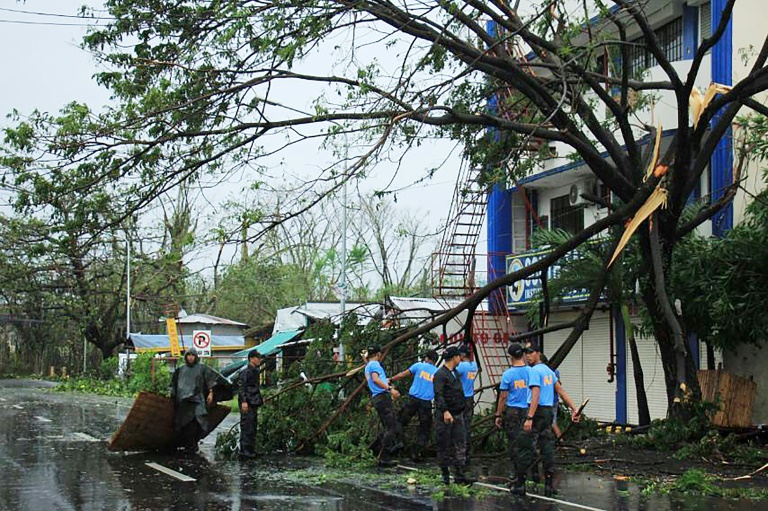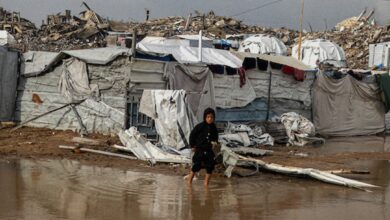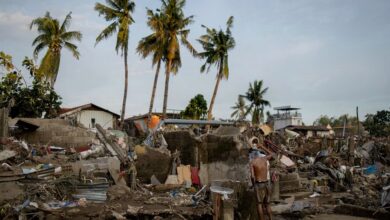
Typhoon Kammuri on Tuesday lashed the Philippines with fierce winds and heavy rain, as hundreds of thousands took refuge in shelters and the capital Manila shut down its international airport over safety concerns.
The powerful storm, which blew in windows and sheared off roofs, roared ashore late Monday and was due to pass south of Manila — home to some 13 million people — and thousands of athletes at the regional Southeast Asian Games.
Forecasters said Kammuri had weakened but remained strong, with sustained winds of up to 150 kilometers (93 miles) per hour, and maximum gusts of 205 kph as it tracked northwest.
“We’re still assessing the damage but it looks like it’s severe,” said Luisito Mendoza, a disaster official in the town where the storm made landfall.
“There is one place where water levels reached the roof… our own personnel got hit by shattered glass,” he added, saying many trees and power poles were felled by wind.
Due to the high winds, Manila’s Ninoy Aquino International Airport was “closed for operations”, airport authority general manager Ed Monreal told AFP.
It was not clear when flights would resume, but authorities gave an estimate of 11:00 pm (1500 GMT) Tuesday and noted their decision would depend on the weather.
Nearly 500 flights were cancelled, and officials warned passengers not to come to the airport.
One the terminals AFP visited, which would normally be bustling with morning departures, was occupied by a handful of staff and stranded passengers.
One traveler, 23-year-old Canadian Constance Benoit, was hit with a nearly day-long delay to her flight back home.
She had arrived in Manila on a typhoon-buffeted flight Monday morning from the central island of Cebu.
“It was the most turbulent flight I ever took in my life,” she told AFP. “I just discovered what airsickness is.”
About 340,000 people had been evacuated from their homes in the central Bicol region, disaster officials said.
People living in low-lying slum districts of Manila were told to leave their makeshift homes as a precaution, but it was not clear how many people were impacted.
The Philippines is hit by an average of 20 storms and typhoons each year, killing hundreds and putting people in disaster-prone areas in a state of constant poverty.
The country’s deadliest cyclone on record was Super Typhoon Haiyan, which left more than 7,300 people dead or missing in 2013.
– Games without spectators –
Kammuri had already snarled some plans for the SEA Games, which opened Saturday and are set to run through December 11 in and around Manila.
The windsurfing competition was halted as a precaution and triathlon events were held earlier than scheduled.
Ramon Suzara, the chief operating officer of the organizing committee, said Monday organizers wanted the competitions to go on.
“Like (for) volleyball, it will continue as long as there is power supply and teams and technical officials are safe, we will continue but without spectators,” he added.
The storm is another difficulty for the Games, which suffered from a string logistical glitches and a rush of last-minute construction in the run-up to Saturday’s opening.
The competition, which is spread across three main sites that are hours’ drive apart, include a Games-records 56 sports and dozens of venues.
Around 8,750 athletes and team officials are expected at this year’s 30th edition — the biggest ever — along with another 12,000 volunteers.
Image: AFP / RAZVALE SAYAT Typhoon Kammuri has lashed the Philippines with fierce winds and heavy rain




